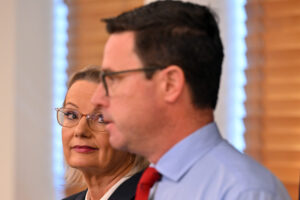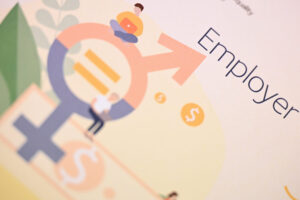It doesn’t matter what the crisis, when it comes to the Morrison government the message is clear: you’re on your own.

It doesn’t matter what the crisis, when it comes to the Morrison government the message is clear: you’re on your own.
As women across Australia lead historic mobilisations demanding government action on gendered violence week, the federal government encouraged women facing domestic abuse to raid their own superannuation accounts.
Calling superannuation withdrawal measures of up to $10,000 “an important last resort lifeline” for women experiencing domestic violence, Minister for Superannuation, Financial Services and the Digital Economy Jane Hume later announced the policy would be reviewed following concerns from frontline workers about victim coercion.
Minister Hume now proposes to strengthen the “integrity” of the scheme with safeguards protecting the free withdrawal of funds. But additional steps for accessing women’s retirement funds do not change the policy’s message: survivors of abuse must fund their own crisis supports. All the while abusers roam free – an addition of intolerable insult to injury.
Safeguards may stop abusive partners forcing women to raid their retirement savings, but it’s not stopping the federal government. The early-release scheme is entirely consistent with the government’s clear established priorities: dismantling the superannuation system – rain, hail or shine.
Women marching for economic security and safety are not just ignored by the government. The Coalition’s anti-superannuation crusade to transform the system into an emergency personal bank account actively exploits women’s heightened COVID-era economic vulnerability.
Women worse off since COVID
In the initial COVID shutdowns, women experienced greater losses of jobs and hours. Against this backdrop of women’s desperation, the federal government introduced the superannuation early release scheme. Significantly, this was introduced two weeks before the introduction of the Coronavirus Supplement and the JobKeeper wage subsidy.
Between April and December 2020, 1.5 million women drew down their super, one-quarter of the entire female workforce. $14.9 billion was stripped from women’s already meagre retirement savings. Some 345,000 women completely emptied their accounts. Many more women aged under 20, and also those aged 36-55 (prime working years pre-retirement), withdrew from their superannuation compared to men.
In 2018, the Coalition announced domestic violence would be added to the list of early release “compassionate grounds”. Frontline domestic violence services voiced concern back then too. Now, pressured by intensifying calls for a proactive government addressing gendered violence, the Coalition suggests “safeguards”.
The federal government acknowledged heightened gendered violence risks during COVID. But it has still failed to give sufficient funding to the domestic violence sector, lift critical income supports for vulnerable women fleeing abuse, or introduce paid domestic violence leave into minimum labour laws. In fact, $1 million was cut from anti-domestic violence education programs in schools in the 2020 October Budget.
Early release scheme exacerbates disadvantage
Women already face systematic disadvantage in the superannuation system and have much lower retirement incomes: they retire with barely half the retirement savings of men. There urgently needs to be targeted reforms to prevent labour market inequalities that reduce women’s career earnings from being baked into the superannuation system as well.
Abolishing the $450 per month minimum threshold, closing the ‘motherhood gap’ by making super payable for all paid and unpaid care-related absences, and proceeding with the legislated increase in the superannuation guarantee (to 12 per cent) are all important to boosting women’s economic security and safety.
In the absence of real action on gendered workplace and domestic violence, the government’s superannuation early release scheme for domestic violence victims only exacerbates women’s economic insecurity.
Women desperate for incomes to survive are more reliant on abusive partners and low-wage casual jobs, more helpless to the threat of ‘handsy’ bosses and colleagues, and below-poverty welfare payments in the future. This latest policy only increases the risks of gendered violence over women’s lifetimes.
For women experiencing job loss, financial hardship or domestic violence, the message from the federal government is one we are getting sick of hearing: in a crisis, you’re on your own.
Australian women deserve so much more.
Between the Lines Newsletter
The biggest stories and the best analysis from the team at the Australia Institute, delivered to your inbox every fortnight.
You might also like
Gender parity closer after federal election but “sufficiently assertive” Liberal women are still outnumbered two to one
Now that the dust has settled on the 2025 federal election, what does it mean for the representation of women in Australian parliaments? In short, there has been a significant improvement at the national level. When we last wrote on this topic, the Australian Senate was majority female but only 40% of House of Representatives
Australia’s parliaments closing in on gender parity, in spite of coalition “women problem” – new analysis
New analysis by The Australia Institute reveals that, following the recent federal election, there are now more women than ever in Australia’s nine parliaments, but the coalition’s so-called “women problem” remains.
Analysis: Will 2025 be a good or bad year for women workers in Australia?
In 2024 we saw some welcome developments for working women, led by government reforms. Benefits from these changes will continue in 2025. However, this year, technological, social and political changes may challenge working women’s economic security and threaten progress towards gender equality at work Here’s our list of five areas we think will impact on


